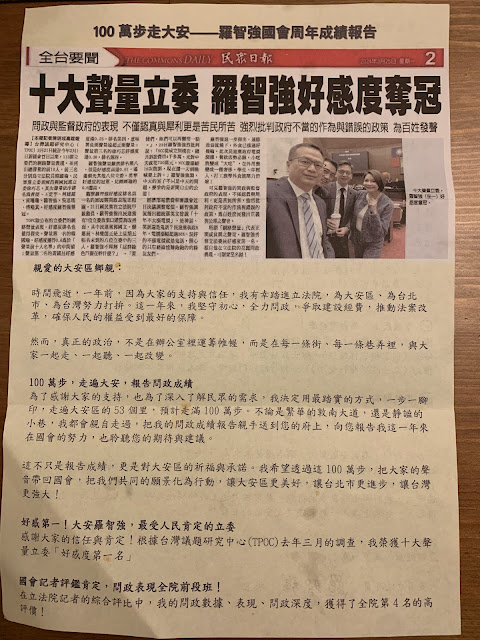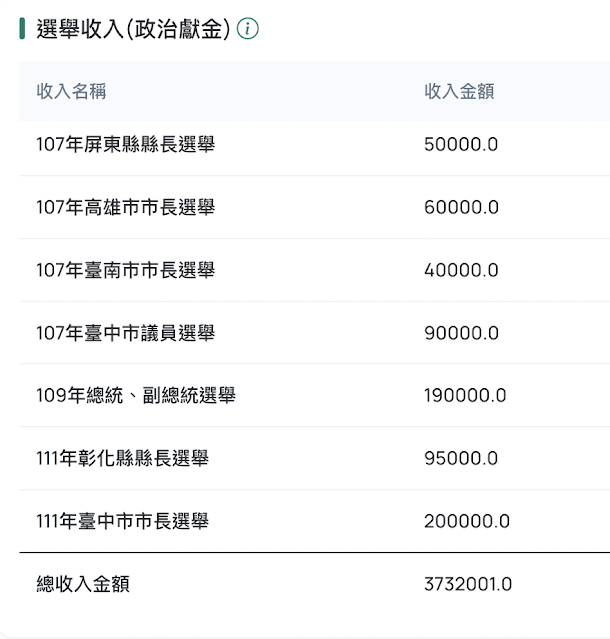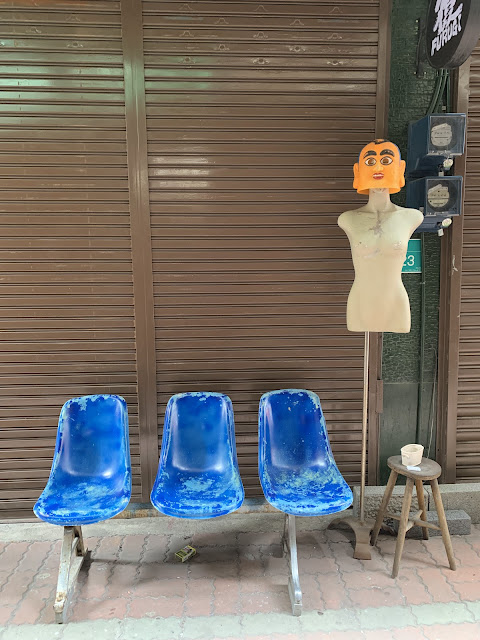I was sitting at a picnic table in central Da'an trying to enjoy the balmy weather and a mediocre latte earlier today when I was approached by Legislator Lo Chih-chiang (羅智強) -- not someone working for him, but Lo himself. He was handing out "newsletters" that, when folded, looked like a newspaper.
Beyond the top third, however, the rest was just generic campaign pap to make Lo look good. I mean, it's mostly nonsense, but it's also nothing we haven't seen before. It's the least interesting thing about Lo's weird fake newspaper and I don't have much to say about it. This Threads post critiques it if you're curious. Some of it is typical district stuff (budgets, social housing, helping the elderly), and some of it is playing up his worst acts as legislator as though they're praiseworthy achievements.
I almost threw the thing in the trash where it belongs, but the fake newspaper caught my eye. Why this design choice? It came with a real article, although the print was so small that it was almost impossible to read. I doubt any of the older people he was handing it to bothered to try.
But first, a bit about the recalls.
Lo isn't running for re-election yet, but he is facing a recall campaign that has real momentum. Of course, the Bullshit Gazette failed to directly address this. The fact that he walked around in person to hand these things out in solidly KMT-voting Da'an, in a neighborhood where he should be very popular, indicates that he's worried that against all odds, the recall might actually succeed.
While not particularly likely, it's also not impossible. Activists running the recall campaigns have achieved surprisingly strong results even in the deepest blue KMT strongholds -- including the public housing complex where I was enjoying my coffee.
Even KMT-affiliated pollsters find that the right to recall is popular, and Lo is frequently attacked for unprofessionalism, a lack of substance and prioritizing influencer-like drama over real policy chops. Here's an example: during a questioning session with the chairman of the National Communications Commission (NCC), he screams "do you know what question I want to ask?" and when the chairman responds that he doesn't, he screams "get off the stage!" repeatedly, like a bratty toddler who needs a nap. Apparently, he shouted for 19 full seconds. The Bullshit Gazette mentions his participation in questioning sessions, but not the temper tantrums.
One of his biggest platforms is something he calls "media freedom" (my words, not his), but is entirely limited to fighting for the resumption of CTiTV (中天), a pro-China news network that lost its license over repeated violations, including taking editorial direction from the CCP via pro-China businessperson Tsai Eng-meng (蔡衍明). CTiTV still has a Youtube presence.
This person in a T-rex costume holding a "recall Lo Chih-chiang" sign looks more professional than that. I'm also a fan of this diss track, though it doesn't have many views.
And that's not even getting into accusations that he's in deep with the CCP, like all of the KMT legislators targeted for recall. He served under Ma Ying-jeou, resigning over the judicial interference kerfuffle with Wang Jin-pyng (王金平) and Ker Chien-ming (柯建銘). He tried to run for the presidency, and two city mayorships but the KMT, seeing him as a weak candidate, pushed him aside. He spent awhile in the Taipei city council before running in a district where it would be difficult to lose.
Now, between screaming at the NCC chair and fighting to keep the death penalty, he spends quite a bit of time defending the trips to China of convicted criminal, CCP collaborator and accused sex pest Fu Kun-chi.
In the last election, Luo faced stiff competition from Social Democratic Party candidate Miao Po-ya (苗博雅), who garnered the best result a non-KMT candidate has ever seen in this staunchly blue district, proving that Da'an doesn't have to be a KMT stronghold, per se. Lo should have been able to crush her, but he won by a narrow margin by Da'an election standards. The DPP isn't doing terribly; they seem to be holding onto popularity better than the KMT.
Where did the article come from, though? Is The Commons Daily (民眾日報) still in print? I'd thought not. Hadn't it at one point taken editorial stances challenging the KMT's Martial Law? Why does it report on statistics with so much circumlocution? (We know the answer to that last one, of course).
Technically it still exists, but the story is wild. Once a local stalwart, it was bought out by the deeply corrupt Pingtung politician Tsai Hau (蔡豪) who, in 2010, invaded the paper's office claiming ownership rights (it's unclear if he actually had such rights). It was then bought by a Hong Kong company called Yitong (一通科技股份有限公司), which apparently went defunct in 2022. Yitong apparently still owns it (how?) but control was transferred to someone named Tsai Yun-yin (蔡雲夤) under a company with no public profile to speak of. I don't know if Tsai Hau and Tsai Yun-yin are related.
There are two websites with something similar to that name, neither of which try to hide their pro-unification stances and neither of which appear to have the workings of a whole newspaper behind them.
They do, however, seem to make political donations and various government tender bids. Huh.
It's not a lot of money by political influence standards, but I wonder where the money is coming from, and who it's going to.
The article comes from the first of these "The Commons Daily" links, but the logo comes from the second. Tsai apparently runs the first, but writes occasional local news articles for the second. I don't think there's any meaningful difference between them. There's also a barely readable third site with a similar name and content to the first, and probably more.
He seems to spend most of his time advocating for unification. It's just another example of Taiwan's media being intentionally hollowed out by unificationist forces creating pro-China "news" outlets.
An article from this extremely sketchy source formed the top third of Lo's "newsletter" isn't proof of any direct connection, but it does perhaps imply one. Why choose this article from a shell newspaper controlled by a company that only seems to have one employee -- Tsai Yun-yin -- whose parent company appears to be defunct (so who's funding it?), and whose main activities seem to be running pro-China news sites using the 民眾日報 name and making various political donations? Where is the donation money coming from?
it does imply a level of "newsiness" to an otherwise nonsense article. Rather like the TPP deliberately choosing the name 「民眾黨」as a callback to Taiwanese history, this paper with a similar name and a long history in Taiwan makes a very deliberate implication. The name, the paper's history and the once-local focus give it an air of Taiwaneseness that it no longer has. This is intentional.
The header and article are both from March 2024 (note the year). It name-checks data from the KMT-affiliated Taiwan Public Opinion Center (TPOC or 台灣議題研究中心) which are AI-generated and based on online data -- it's a type of data, but not a poll or survey in the traditional sense. The "top ten" in terms of "voice" that the article references are not ranked in terms of popularity but some algorithm of online impressions and interaction.
The March 2024 data is here, but what's more interesting is the 2025 version, and Lo doesn't rate. 2025 data also show the DPP has a lot more mobilization.
I found a similar poll from 2024, but from a different source, but Lo's favorability is shown as quite a bit lower than the article's claims (0.41 rather than 0.6). Not that data from 2024 means anything today -- a lot has happened since then.
That's not even getting into the odd presentation of the statistics. If Lo were popular, he wouldn't have to claim (questionably) that he had the highest favorability among this set of politicians in 2024. He could just say he's got high favorability now.
There don't seem to be any statistics on his current favorability: at least, I couldn't find any after both searching and asking around. This poll from January says 60% of his constituents oppose recalling him, but the recall movement has gained momentum since then, and that's not a favorability ranking. What's more, it's from Lo's own think tank, so there's a conflict of interest there.
I did find this from the TPOC and it doesn't look good, but I doubt it means much:
Let's talk a little about these think tank names. In a similar vein to using "people's" (民眾, not 人民 which has a bit of a "China" flavor) as a callback to a 1920s political party that advocated democratic reform and home rule, I can't help but notice that Lo's organization, the New Congress Think Tank (新國會智庫), sounds seemingly intentionally like the Taiwan Braintrust in Mandarin (新國會國智策庫). There are no results for Lo's think tank that I can find, but a search implies that the two think tanks are the same. They most certainly are not.
The TPOC (KMT-affiliated, mostly uses AI-generated data of online influence reported widely by pan-blue media) and TPOF (an actual pollster reported widely by everyone else) have similar naming issues in English, but are more easily differentiated in Mandarin.
Lo's choice of article is also telling: nobody reads the newspaper he copped the article from anymore. It doesn't prove that Lo is in cahoots with the unificationists who hollowed out The Commons Daily to turn it into a pro-China mouthpiece, per se. It doesn't really matter, though; he has about as much substance as the website his "newsletter" quotes, and he's got similarly pro-China rhetoric. It doesn't matter if they're in the same circle of traitors and sellouts; their end goal is essentially the same.
I'm not the only one to have noticed all this, but I am the only person writing in English who decided to go down this rabbit hole.
It's quite a bit of effort to try to convince one's constituents that you're popular and influential and fighting for their rights rather than collaborating with Taiwan's biggest enemy.
But if Lo needs to take an article from an extremely dodgy pro-China source from 2024 to help make his case, he hasn't got a case to make at all.












